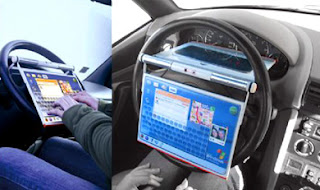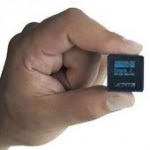How Not to Pack A Laptop When You Travel By A Plane
So why shouldn't you pack your notebook in a checked suitcase when you travel by plane? Here are three excellent reasons.
1. Your Notebook Could Be Damaged
You may have taken the utmost care in packing your notebook. However, what happens to your suitcase and its contents once you check it is out of your control.
"Airlines often load bags on top of one another in the cargo hold of your flight," warns the Transportation Security Administration on its Web site. "Your baggage may be loaded with hundreds of other bags, with possibly several on top of yours. Hundreds of pounds of pressure in conjunction with high altitude and the resulting low temperatures" while the plane is in flight "create an ideal environment for damaged laptops," according to the site. "These conditions crack cases and damage screens among other things. For these reasons, we recommend that you keep your laptop in your carry-on bag when traveling."
2. Your Notebook Could Be Stolen
While I'm sure the vast majority of baggage handlers and airport screeners are honest, all you need is one dishonest opportunist who spots your laptop in an X-ray screening.
For instance, on two different trips, I packed low-cost electronic items in my checked baggage--mainly iPod accessories--and found them missing when I unpacked. (Needless to say, I no longer pack any electronics in my checked suitcase.)
Also, keep in mind some thieves are more interested in a laptop's hard drive data than the computer itself. The drive may include information, such as social security numbers, that can be sold or exploited for identity theft. Do you really want to risk having data like that fall into the wrong hands?
3. Your Notebook Could Get Lost
If you've packed a notebook in your checked bag and the airline loses that bag, you're out of luck. Oh, and do you think the airlines will reimburse you for that laptop? They probably won't.
On U.S. domestic flights, there's a $2800 compensation limit per person total (not per bag) for lost or damaged baggage. And so, in theory, if you've packed a $3000 laptop in your checked bag and the bag goes missing in action, you're out at least $200. For international trips, airline liability is capped at $1500 per passenger.
However, many airlines specifically exclude computer equipment from their liability--meaning they don't have to pay you anything if your laptop is lost, stolen, or broken during a flight.
For example, go to Delta's Declaring Baggage Value page and you'll read this policy: "Delta is not responsible or liable for cash, camera equipment, commercial effects, computer software and equipment, electronic equipment, fragile articles, jewelry, lifesaving medication, negotiable papers, irreplaceable business documents, works of art or other similar valuable items contained in checked or unchecked baggage."
Other airlines have similar policies, including American Airlines, Continental Airlines, United, and US Airways.
What Are Your Options?
If you must pack your notebook in a checked suitcase--as some travelers were forced to do last summer, following an alleged terrorist threat--then you'll need to take precautions.
* Back up your data before you begin your trip, and make sure it's password protected at a minimum. Consider removing your laptop's hard drive and packing it (carefully) in your carry-on bag.
* Pack the notebook in a shock-resistant case, such as an Otterbox, or buy a ruggedized notebook.
* Put a TSA-approved lock on your checked bag to reduce the chances that an unscrupulous baggage handler will steal your laptop.
* Look into buying insurance for your notebook from the likes of Safeware.
* Consider using a service that tracks, locates, and recovers stolen laptops, such as LoJack for Laptops ($50 a year).
[Source]
1. Your Notebook Could Be Damaged
You may have taken the utmost care in packing your notebook. However, what happens to your suitcase and its contents once you check it is out of your control.
"Airlines often load bags on top of one another in the cargo hold of your flight," warns the Transportation Security Administration on its Web site. "Your baggage may be loaded with hundreds of other bags, with possibly several on top of yours. Hundreds of pounds of pressure in conjunction with high altitude and the resulting low temperatures" while the plane is in flight "create an ideal environment for damaged laptops," according to the site. "These conditions crack cases and damage screens among other things. For these reasons, we recommend that you keep your laptop in your carry-on bag when traveling."
2. Your Notebook Could Be Stolen
While I'm sure the vast majority of baggage handlers and airport screeners are honest, all you need is one dishonest opportunist who spots your laptop in an X-ray screening.
For instance, on two different trips, I packed low-cost electronic items in my checked baggage--mainly iPod accessories--and found them missing when I unpacked. (Needless to say, I no longer pack any electronics in my checked suitcase.)
Also, keep in mind some thieves are more interested in a laptop's hard drive data than the computer itself. The drive may include information, such as social security numbers, that can be sold or exploited for identity theft. Do you really want to risk having data like that fall into the wrong hands?
3. Your Notebook Could Get Lost
If you've packed a notebook in your checked bag and the airline loses that bag, you're out of luck. Oh, and do you think the airlines will reimburse you for that laptop? They probably won't.
On U.S. domestic flights, there's a $2800 compensation limit per person total (not per bag) for lost or damaged baggage. And so, in theory, if you've packed a $3000 laptop in your checked bag and the bag goes missing in action, you're out at least $200. For international trips, airline liability is capped at $1500 per passenger.
However, many airlines specifically exclude computer equipment from their liability--meaning they don't have to pay you anything if your laptop is lost, stolen, or broken during a flight.
For example, go to Delta's Declaring Baggage Value page and you'll read this policy: "Delta is not responsible or liable for cash, camera equipment, commercial effects, computer software and equipment, electronic equipment, fragile articles, jewelry, lifesaving medication, negotiable papers, irreplaceable business documents, works of art or other similar valuable items contained in checked or unchecked baggage."
Other airlines have similar policies, including American Airlines, Continental Airlines, United, and US Airways.
What Are Your Options?
If you must pack your notebook in a checked suitcase--as some travelers were forced to do last summer, following an alleged terrorist threat--then you'll need to take precautions.
* Back up your data before you begin your trip, and make sure it's password protected at a minimum. Consider removing your laptop's hard drive and packing it (carefully) in your carry-on bag.
* Pack the notebook in a shock-resistant case, such as an Otterbox, or buy a ruggedized notebook.
* Put a TSA-approved lock on your checked bag to reduce the chances that an unscrupulous baggage handler will steal your laptop.
* Look into buying insurance for your notebook from the likes of Safeware.
* Consider using a service that tracks, locates, and recovers stolen laptops, such as LoJack for Laptops ($50 a year).
[Source]










